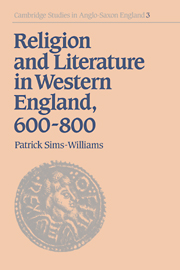Book contents
- Frontmatter
- Contents
- Preface
- List of abbreviations
- Map
- 1 Introduction
- 2 The kingdoms of the Hwicce and the Magonsætan
- 3 Paganism and Christianity
- 4 Early influences on the church
- 5 Varieties of monasticism
- 6 The eighth-century church
- 7 Biblical study
- 8 Letter-writing
- 9 The unseen world: the monk of Wenlock's vision
- 10 Prayer and magic
- 11 Milred, Cuthbert and Anglo-Latin poetry
- 12 The church in the landscape
- 13 Conclusion
- Bibliography
- Index
2 - The kingdoms of the Hwicce and the Magonsætan
Published online by Cambridge University Press: 20 October 2009
- Frontmatter
- Contents
- Preface
- List of abbreviations
- Map
- 1 Introduction
- 2 The kingdoms of the Hwicce and the Magonsætan
- 3 Paganism and Christianity
- 4 Early influences on the church
- 5 Varieties of monasticism
- 6 The eighth-century church
- 7 Biblical study
- 8 Letter-writing
- 9 The unseen world: the monk of Wenlock's vision
- 10 Prayer and magic
- 11 Milred, Cuthbert and Anglo-Latin poetry
- 12 The church in the landscape
- 13 Conclusion
- Bibliography
- Index
Summary
THE ANGLO-SAXON SETTLEMENT
The early history of Mercia and its sub-kingdoms is obscure because no early traditions about the area have survived from Mercia itself, with a few exceptions such as the Mercian royal genealogies and probably the so-called Tribal Hidage. We know about it from the traditions of Mercia's ancient enemies, who were interested in Mercian affairs only insofar as they impinged on their own histories. Neither Bede in Northumbria nor his Kentish and West Saxon informants seem to know much about the settlement of central England; neither do the Welsh sources nor the early part of the Anglo-Saxon Chronicle, which reflects the interests of the West Saxon royal house and, in any case, only begins to provide useful information in the seventh century. The Mercians do not appear in the Historia ecclesiastica until Bede has occasion to mention that two of Edwin of Northumbrians sons were born during Edwin's exile (that is, before 616) to Cwenburg, daughter of the Mercian king Ceorl. Similarly the Hwicce first enter history because a Northumbrian, St Wilfrid, encountered a princess of their race in Sussex in about 680; and the Magonsætan are not named at all by Bede. It is oddly symptomatic of the way the Mercians are known from the point of view of their neighbours that their very name, Mierce, means ‘frontier folk’.
The Tribal Hidage is a presumably Mercian memorandum, of uncertain practical purpose, estimating the extent of various peoples. It may be as old as the time of Bede, or still earlier, but the manuscripts are eleventh-century and later and the text has probably suffered a good deal of corruption and alteration.
- Type
- Chapter
- Information
- Religion and Literature in Western England, 600–800 , pp. 16 - 53Publisher: Cambridge University PressPrint publication year: 1990



